The water pump plays a significant role in the cooling system of your car. It takes the fluid from the radiator and distributes it all over the engine. The engine of your car, truck or SUV is kept cool thanks to the coolant that flows through the engine and absorbs heat from the moving parts. With the help of the radiator fan and outside air, the coolant’s temperature is dropped before it is recirculated through the engine. A water pump typically lasts between 60,000 and 90,000. There are a few symptoms of a faulty water pump. Furthermore, the user inquiry, “Does a Bad Water Pump Make Noise?” arises far too often.
Does a Bad Water Pump Make Like?
As it worsens, a water pump may make noises like rattling, clicking, or whining. It’s possible that some of these noises have simple causes, while others may require a new water pump.
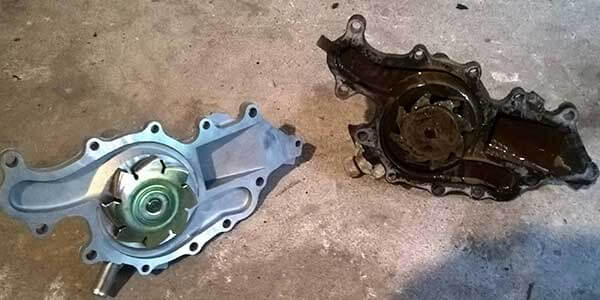
Let’s get into detail:
Rattling Noise
A Rattling noise could indicate one of two problems:
- Defective bearings
- The impeller shaft is damaged and may be bent or broken.
The majority of water pumps break down due to worn-out bearings. Due to the massive amounts of coolant, they must transport, water pumps eventually fail. Inquire as to whether or not the client has loosened a belt tensioner and inspected the water pump. In addition to belts, worn-out belt tensioners can make a rattling sound. To check if the pump rotates smoothly after the belt is loosened, have the customer spin it by hand. The same method can be used to inspect the tensioners.
Uneven belt stress can cause the shafts of impellers to bend. An impeller shaft failure indicates that the client has put off fixing the water pump for some time. Water pump seals, bearings, and the impeller shaft can all be damaged by using several coolants or improper coolant. Inspect the customer’s old pump for corrosion on the impeller if they brought it in. You should suggest flushing and refilling the cooling system if the impeller appears rusted.
With regular use, the impeller shaft might corrode and eventually break. If that’s the case, it’s not enough to just replace the water pump; you’ll also need to flush the colon, as there’s a good risk that a lot of the dirt-adding residue of rust will go into the coolant and contaminate it.
The Water Pump Makes A Clicking Noise.
If your car’s water pump is making a clicking sound, especially when the engine is not running, it probably has a faulty bearing or a loose tensioner. For this reason, you should attempt manually turning the water pump to see whether that corrects the problem. It’s possible that the clicking sounds coming from your water pump are actually coming from a loose tensioner.
The Water Pump Is Making a Whining Noise or Groaning Noise
Finally, once the engine temperature has reached a certain point, you may notice a peculiar whining sound coming from the water pump every time you start the engine. The whining sound is usually caused by the drive belt or the water pump pulley.
Corrosion, rust, or holes and cracks across the bolt holes are likely the primary causes of damage to a water pump pulley. The pulley won’t be securely fastened while spinning, thus you should expect an odd whining sound.
What are the Symptoms of Bad Water Pump?
Leaking Coolant
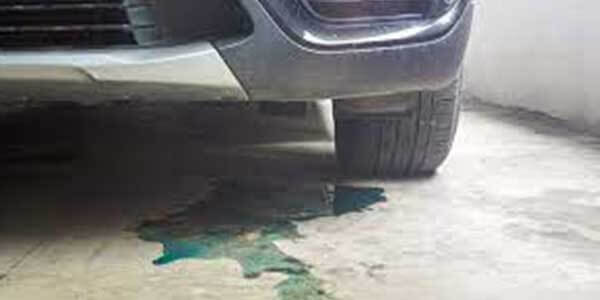
Water leaking from the pump is another sign apart from whining or rattling noise that something is wrong. The hoses that attach the pump to the engine, as well as the seals around the pump, are potential sources of leakage. Leaks should be repaired immediately because they might cause costly damage to other components of your vehicle.
It’s important to remember that other areas of your car, including the radiator and the expansion tank, might also spring leaks. And it needn’t be something harmful; it could just be moisture from your air conditioner.
Steam Blowing From the Radiator
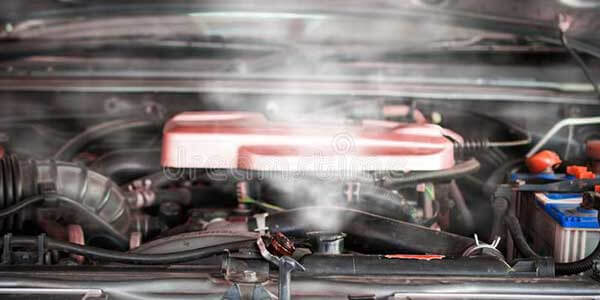
Every time you see steam coming out of your radiator, it’s a dangerous sign that your engine is overheating and could soon be severely damaged.
Pull over immediately if you observe steam or smoke coming from under the hood, and have a tow truck transport your vehicle to the nearest repair shop. Avoid risky situations and expensive repairs by pulling over if your engine begins to overheat. If you notice this sign, it’s advised to err on the side of caution and call a tow truck.
Overheating is not only uncomfortable, but it can also indicate a far more serious issue with the radiator.
Engine Overheating
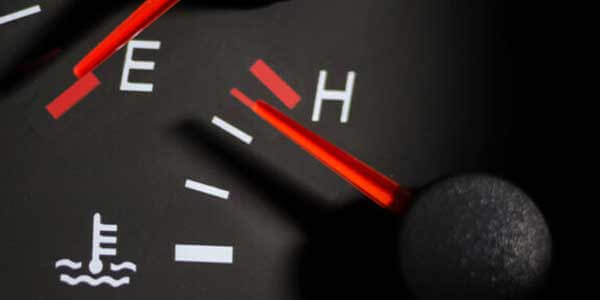
When your car’s water pump dies or stops working, the engine quickly overheats because no coolant is being pumped through the system. If the engine is allowed to become too hot, it could shatter the block, the cylinders, the pistons, and the head gasket. Vehicles that are overheating or have steam coming from under the hood should not be driven.
Having Issues with Performance
In the event that your vehicle’s performance is waning, you could try replacing the water pump. Overheating, diminished acceleration, and power loss are just some of the problems that might result from a malfunctioning water pump.
Higher-than-usual temperature measurement on the dashboard or increased fuel use is both signs of a problem.
A Blown Gasket Can Happen If You Have a Bad Water Pump
Car repairs can get pricey if the water pump fails while you’re driving it. Changing a blown head gasket is just the beginning of what may be a very expensive repair job. Burned pistons and broken cylinder heads are just two examples of collateral harm that can result from a malfunctioning water pump. If your water pump is acting up, you should have it fixed as soon as possible. You risk getting stuck with an automobile that is beyond repair if you don’t.
If your water pump begins to malfunction, what can you do? Having it replaced by a professional mechanic is usually your best bet. You can have it replaced professionally, but if you’re feeling daring, you can give it a shot yourself. The two most crucial things are caution and thorough preparation.
It’s not that hard to replace a water pump yourself if you’re careful and you know what you’re doing. However, if you are not confident in your mechanical abilities, it is best to have it serviced by a professional mechanic.
How Much Does A Faulty Water Pump Cost To Replace?
The price tag to change out a water pump is between $300 and $800. To a large extent, this range is determined by the type of vehicle and the place in which the work is completed. You shouldn’t spend more than $300 on parts, and the price of labor can be anything from $250 to $425.
Changing out a water pump could need for specialized mechanical knowledge, therefore it’s important to choose somewhere with the correct expertise. You should never choose the cheapest option without also considering the quality of the mechanic executing the work to ensure that no new issues are caused by carelessness.
You should make sure you have the proper mechanical skills before attempting to replace your water pump. Instead of learning the hard way by replacing your car’s water pump yourself, you may want to consider paying a professional to do it. It may be crucial that you do not cause any harm to your pricey car.
How Long Can A Water Pump Be Expected To Function?
The water pump in your car should last you somewhere between 60,000 and 90,000 miles. For these estimates, typical maintenance and prompt attention to any indications of water pump malfunction are assumed. A major water pump repair is not unheard of before 60,000 miles.
Approximately How Long Does It Take To Switch Out A Broken Water Pump?
Water pump replacement typically takes between two and three hours, which is about par for the course when it comes to auto maintenance, according to carfax.com. Whenever the timing belt starts to fail, it is recommended by automotive experts that you replace the water pump as well. If you plan on having the work done at a dealership or other similarly pricey place, this can save you a ton of money in both materials and labor.
Exactly Where Is The Water Pump Placed?
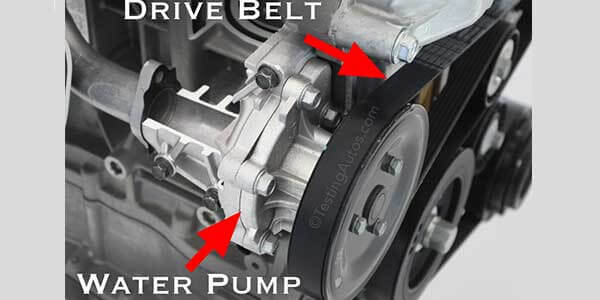
Depending on the make and model of the vehicle, the water pump may be located wherever the drive belt can reach it. To prevent overheating, it circulates water and antifreeze (coolant) through the engine. Since it is connected to the crankshaft, the water pump spins at the same rate as the engine.
Conclusion
A bad water pump can cause a variety of problems for your vehicle, including loud or unusual noises, low coolant levels, overheating, and leaks. The most common cause of failure is a worn-out bearing, but overheating, lack of maintenance, and poor-quality coolant can also contribute. The cost of replacing a water pump can vary, but on average it can range from $300 to $800. While in some cases a water pump can be repaired, if the pump is severely damaged or worn, it will likely need to be replaced. It is important to be aware of the signs of a bad water pump and address any issues as soon as possible to prevent damage to the engine.
Frequently Asked Questions:
When the engine is turned off, will there still be water leaking from the water pump?
Since nothing is turning the water pump when the engine is turned off, any leaks would occur only if the pump wasn’t properly sealed. Since the water pump is typically not easily accessible, pinpointing the exact site of the leak can be challenging; thus, we recommend consulting a specialist.
When the coolant is gone but the water pump is fine, what should I do?
If you notice that your coolant level is dropping, the first thing to look for is a visible leak. A leaking pressure cap might cause the coolant to leak over time.
When the pressure in the vehicle’s cooling system drops too low, steam and hot engine coolant leak out, causing the engine to overheat and possibly destroying internal components like the pistons and cylinder heads.
The sooner a leak is fixed after it has developed, the less likely it is that the entire engine would become polluted with fluid, resulting in a burst head gasket or other problems.
What causes a water pump to fail?
The most common cause of water pump failure is a worn-out bearing. Overheating, lack of maintenance and poor-quality coolant can also contribute to water pump failure.
How often should a water pump be replaced?
The typical lifespan of a water pump is around 60,000 to 90,000 miles or 5-7 years. However, this can vary depending on usage and maintenance.
What is the cost of replacing a water pump?
The cost of replacing a water pump can vary depending on the make and model of the vehicle. On average, the cost can range from $300 to $800.
Can a water pump be repaired instead of replaced?
In some cases, a water pump can be repaired by replacing the bearing or seals. However, if the pump is severely damaged or worn, it will likely need to be replaced.
You might want to see this:
- Car Makes Rattling Noise When Accelerating
- Clicking Noise From Front Wheel When Driving
- Why My Car Makes Noise When Turning Right but Not Left – Solutions
